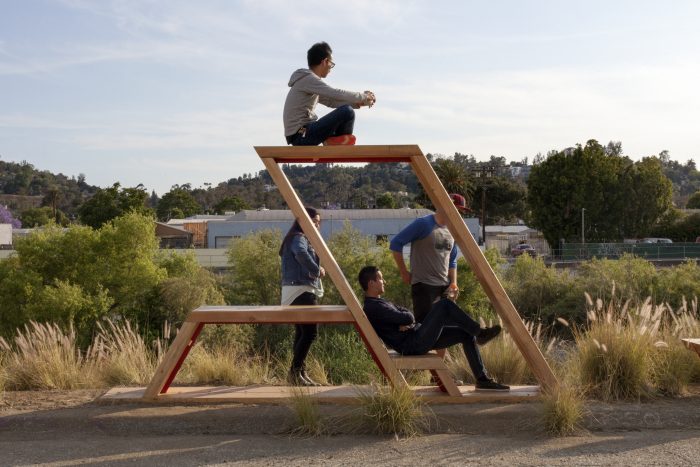School of Architecture
Sustainable Practices
Bachelor of Arts in Sustainable Practices [STEM Program]
The BA in Sustainable Practices is a new interdisciplinary degree that integrates knowledge of design, economics, policy, and environment to advance the field of sustainability. It promotes a rigorous understanding of how resources are used and how decisions are made in society, as well as the impact of technology and consumption on the environment. Central to the curriculum are interdisciplinary, problem-based studio courses that challenge students to develop links between the theory and practice of sustainability in real-world contexts.
Sustainable Practices is a STEM program. Learn more about STEM at Woodbury.
Apply Request Information Take a TourResearch that fuels innovation
Evaluate the role and effectiveness of a broad range of methods of inquiry and analysis in order to understand the concepts and methods of different academic disciplines and the way in which these can address sustainability challenges.

Holistic problem solving
Identify holistic ways of understanding sustainability problems, the concepts of sustainability, the issues involved, and the disciplines needed to address real-world problems.

Reform policy
Evaluate and challenge sustainability policies among institutions for water, land, air, and urban management from the local to the global level.
Sustainable Practices Course Requirements
The Sustainable Practices program offers a comprehensive course schedule. Please see below for more details and the side panels for detailed descriptions of the coursework.
SUPR 1XX: Environmental Problems and Design
This studio course introduces students to the many dimensions of problem-solving in environmentally based design. Students use fieldwork and case studies informed by interdisciplinary inquiry to study actual sites around Los Angeles, which becomes a living laboratory. This helps us to identify the relationship between climate change and the built environment and re-envision solutions for current and future design challenges. Emphasis is placed on visualizing and communicating data, application of interdisciplinary analysis tools across multiple information formats, and collaborative problem-solving. Key course objectives include understanding changing relations between humans and the environment, effectively communicating findings in a rapidly shifting environmental design discourse, and the ability to identify and articulate design opportunities for addressing climate change impacts.
SUPR 1XX : Environmental Policy and Management
This course explores how complex decision-making processes lead to the design and enactment of effective environmental policies. We explore multiple pathways by which historical and recent, and local and international environmental crises shape new policy adoption. Students have the opportunity to use management tools to explore case study methodology, current policy proposals, and real-world scenarios. Students also engage current environmental policy mechanisms to debate and resolve environmental policy proposals by adopting multiple stakeholders’ perspectives, leading to the writing and presentation of their own policy interventions.
ENVT 230: Ecology/Earth Sci./Infrastructure
This course invites students to consider and acknowledge the symbiotic relationship between the natural and built environments, and how our personal ecological footprint at the micro-level and infrastructure at the macro-level impact those environments. Course readings, movies, and field trips help students understand the delicate balance between our ecosystems and urban contexts, and the need for development to occur in more sustainable ways. Students explore responsible decision-making tactics and processes such as the use of “negative emissions” as a means of ecosystem restoration, and how to leverage our own agency and advocate for change.
ENVT 1XX: Intro to GIS
Geographic Information Systems (GIS) are employed by a wide range of fields and disciplines, from environmental science to healthcare, business, real estate development, urban planning, and construction management. GIS software links geography (locations and shapes of constructed or natural features) with attributes (quantities such as number of people, qualities such as type of species, or level of contamination hazard). This course serves as an introduction to the concepts and practice of GIS and seeks to familiarize students with the many applications of GIS technologies. Utilizing a project-based methodology throughout the course, students will have the opportunity to merge application and theoretical topics. Studio format.
MA SUPR XX: Sustainable Practices: Design
This studio course introduces the social justice aspects of sustainability practice. Sustainability problems arise from a complex set of issues spread across various scales and can threaten underlying social, economic, and ecological systems. These systems are both intertwined and interdependent, and disproportionately impact communities of color. Studio projects give students an opportunity to explore design projects that prioritize environmental justice issues in addressing these inequities.
MA SUPR 210: Intermediate GIS: Design
This course reinforces core GIS cartographic principles and methodologies learned in GIS 1 and applies them to topics in energy, water, air, and land resource management. Course assignments introduce students to additional techniques in map layout, design, and geoprocessing tools. Students engage a hands-on, project-based approach to applying GIS technology to a specific environmental concern.
MA SUPR 2XX: Environmental Core Design
This studio course examines multiple approaches to sustainable design and accountability as measured by LEED, USGBC, the 2030 Challenge, and the World Economic Forum’s Zero–Net Carbon Challenge. Students learn to assess physical building performance through an introduction to evolving building technologies, computer-based analysis tools, and other diagnostic metrics. Class content prioritizes context analysis and the need for symbiotic relationships between the built and natural environments in the development of student proposals. Case studies and site visits provide historical and contemporary examples for investigation.
MA SUPR 2XX: Core Workshop Management
This course introduces students to management strategies and tools necessary to engage in sustainability careers. Project management approaches analyzed prioritize an integrated approach, weaving together project lifecycles, management processes, and environmental priorities. Topics include how to apply economic principles to environmental goods and services allocation, decision-making under uncertainty, and adaptation to and mitigation of environmental change. As a professional practice course, the course looks closely at case studies in organizational behavior and leadership. Students are encouraged to adopt an entrepreneurial, team-focused, and social responsibility mindset in their projects.
MA SUPR 3XX: Interdisciplinary Environmental Research Seminar
Solving environmental challenges requires integrating expertise from many different fields. This course helps students apply interdisciplinary research methodologies to investigating problems and exploring solutions to our climate crisis.
MA SUPR 3XX: Studio
This design studio examines the evolving interface between sustainability, human enterprise, and new technologies. Given the emergent nature of this topic, class discussions and assignments engage current, real-world examples to explore and apply a creative, integrated approach to sustainability, innovation, and entrepreneurship. Students become conversant in software tools that help them analyze new economic models and public policies and their potential impacts on different communities.
MA SUPR 3XX: Urban Elective
This specialized course focuses on current topics in environmental sustainability and urbanism.
MA SUPR 320: Environmental Economics
This course introduces economic principles and tools used to analyze and ameliorate environmental challenges. Course content reviews how market economies and other economic systems perpetuate natural resource depletion and how students might rethink renewable and nonrenewable resource issues in economic terms. Students are introduced to micro- and macro-economic theories and test them through real-world case studies in corporate accountability, uneven resource allocation, environmental injustice, scarcity, and consumer choice. The class pays particular attention to the independent and complementary roles of markets and governments in national and international contexts.
MA SUPR 3XX: Energy and Society
How we produce and use energy has a far-reaching impact on our communities, both local and global. This course examines the historical conditions that shaped major developments in energy extraction and consumption, from fossil fuel dependence and resource depletion to renewable and sustainable alternatives, and then analyzes how these approaches are currently being perpetuated and/or rethought. As part of this process, students consider the fundamentals of energy science, infrastructures, and alternative technologies. Importantly, the course takes a social justice lens to explore how power and inequality shape energy access and the uneven impact energy production has on different communities and geographic regions. Class projects include a group environmental project and paper, such as a beach cleanup, a film review, and a group presentation on a research topic. Field trips and guest speakers inform students’ understanding of how social, political, and cultural factors shape energy in Southern California.
MA SUPR 4XX: Studio
This synthesis studio is a summative expression of student learning in an interdisciplinary, sustainable practices project. Students develop a comprehensive, visual work that demonstrates an integrated approach to engaging and/or resolving a real-world environmental problem.
MA SUPR 399: Internship
Students obtain practical, on-the-job training in a setting related to their environmental career and educational goals. The purpose is to gain experiential, impactful learning in a professional setting before graduation. Internship placements prioritize work with local, state, and federal agencies, non-governmental organizations, or private companies that prioritize sustainable practices and support underrepresented people in STEM fields. Work experience is complemented by an academic requirement and periodic meetings with the student’s on-campus career advisor.
SUPR 4XX CAPSTONE THESIS
The capstone thesis focuses on the development and/or implementation of a sustainable practices design-build project on campus or in the community. Ideally, the course pairs sustainable practices students with students in the environmental science and construction management majors to work collaboratively on solving an interdisciplinary, environmental design problem. Studio.
Careers
Woodbury School of Architecture supports our students in building a strong foundation for professional practice while investigating the nature of practice itself. These experiences prepare students to make informed choices regarding their diverse career options. Visit our School of Architecture Career Services page for more information.
Faculty
Our faculty are architects, designers, academics and policy makers practicing in Los Angeles, San Diego and Tijuana. This internationally recognized and award-winning group works closely with students to teach the skills required to push the limits of practice.